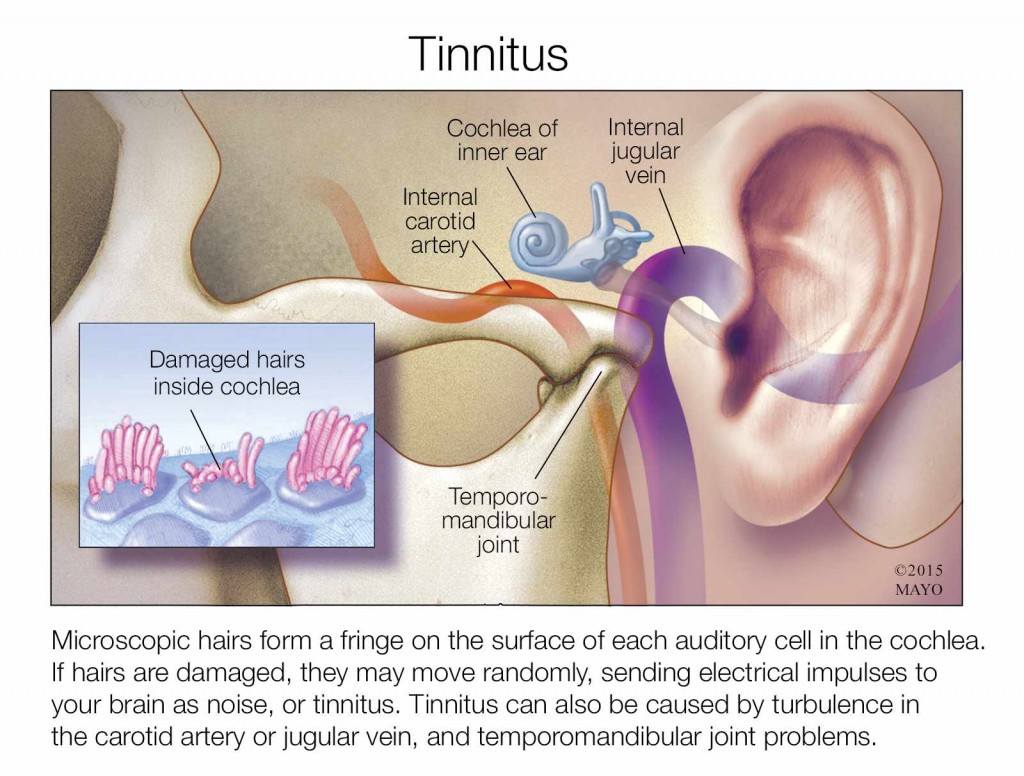-
Mayo Clinic Q and A: Tinnitus can interfere with hearing but doesn’t cause hearing loss
DEAR MAYO CLINIC: For the past several months I have had a high-pitched ringing in my ears. It comes and goes, but lately it seems to happen more frequently. My doctor said that it is tinnitus and is quite common, but I am concerned and want to know what could have caused it. Could it be related to stress? Does it ever lead to hearing loss?
ANSWER: Tinnitus involves hearing noise in one or both ears that is not caused by an external sound. Tinnitus is common, but it is not a condition on its own. Rather, it is a symptom of another underlying condition.
The noise of tinnitus often sounds like a ringing in the ears, but it can also be buzzing, clicking, roaring or hissing. The noise may vary in pitch from a low roar to a high squeal. In some cases, the sound can be so loud that it interferes with your ability to concentrate or to hear actual sound. Tinnitus may be present all the time, or it may come and go.
You need additional evaluation to see if the cause of your tinnitus can be found and treated. If after that assessment the cause remains unclear, then you and your health care provider should discuss how to best treat your symptoms. Although severe tinnitus can interfere with your hearing, the condition does not cause hearing loss.
Tinnitus is a symptom associated with many ear disorders. A common cause of tinnitus is inner ear damage. Tiny, delicate hairs in your inner ear move with the pressure of sound waves. That movement triggers the cells in your ear to release an electrical signal. The signal travels from your ear, through the auditory nerve and into your brain. Your brain interprets the signal as sound.
If the hair cells inside your inner ear are broken, bent or otherwise damaged, they may spark random electrical impulses to your brain, causing tinnitus. Some of the ear conditions that can lead to tinnitus include exposure to loud sound, age-related hearing loss, earwax buildup and changes within your ear bones.
It is not only ear problems that can lead to tinnitus, however. Other conditions that can cause it include cardiovascular disease, allergies, anemia and some jaw disorders. Other factors such as diet, stress and certain medications can play a role in the development of tinnitus, too.
Reviewing your medical history with your primary health care provider, along with getting a thorough physical exam and having diagnostic tests, can help provide vital clues to the cause of your tinnitus. You may be referred to an otologist for a more thorough evaluation of your ears and possible cause of your tinnitus.
In many cases, a hearing exam completed by an audiologist is a key part of a tinnitus assessment. This test involves listening for sounds played through earphones into one ear at a time and signaling when you can hear the sounds. This exam is not painful. A hearing exam may be able to help identify ear disorders or hearing problems. Imaging exams, blood tests and other procedures may be necessary, as well, depending on your medical situation.
If an evaluation reveals an underlying condition, then treatment for that condition often relieves tinnitus. If the cause cannot be identified, then talk to your health care provider about treatment to help ease tinnitus. Commonly, an audiologist can assist you in using a hearing aid, white noise machine or another similar device to help mask tinnitus and make your symptoms less bothersome. — Jamie Bogle, Au.D., Ph.D., Audiology, Mayo Clinic, Scottsdale, Ariz.








